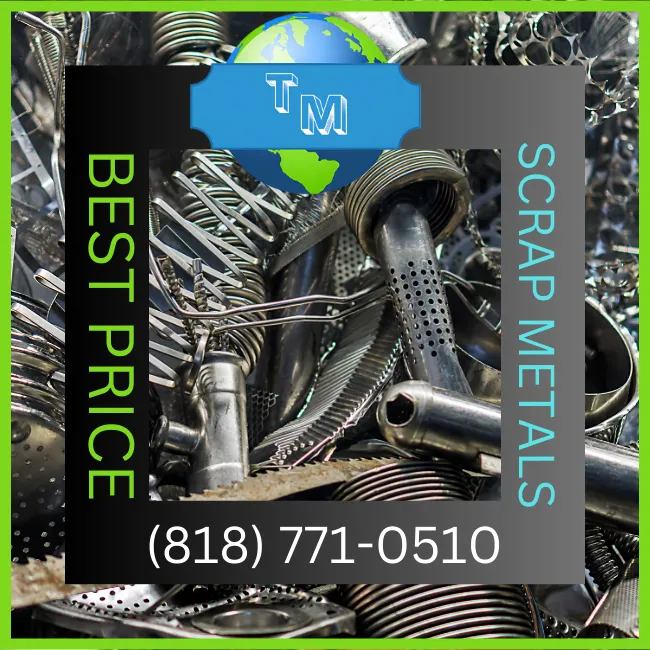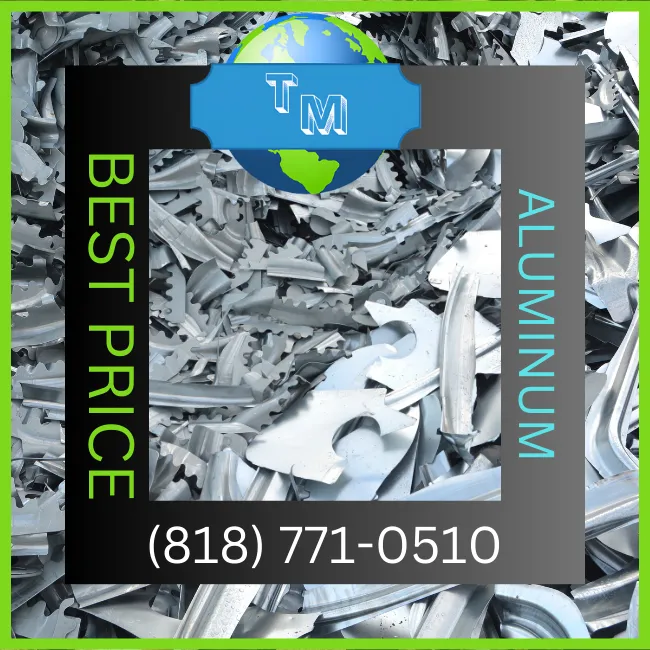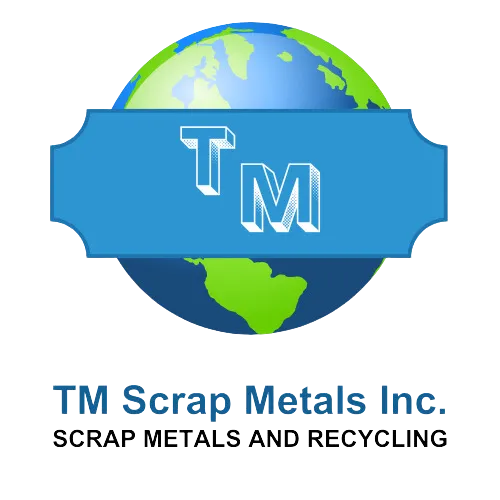Sponsored





Scrap Metal Recycling in Sun Valley
Top Local Scrap Yards & Metal Recyclers You Can Trust
Looking to recycle scrap metal in Sun Valley? Find reliable local scrap yards that offer fast, eco-friendly metal recycling for aluminum, copper, steel, and more. These trusted professionals ensure fair pricing, quick service, and convenient drop-off or pickup options. Browse our directory to connect with top-rated Sun Valley recyclers today!
Scrap Metal Recycling in Sun Valley: Why Hire a Professional Scrap Metal Recycling Service
The Importance of Expert Scrap Metal Disposal and Environmental Sustainability
Understanding Scrap Metal Recycling in Sun Valley
Scrap metal recycling in Sun Valley is more than just an industry; it's a crucial component of sustainable urban living. In this thriving California community, recycling metal helps reduce environmental degradation, conserves natural resources, and minimizes landfill use. However, while some residents and businesses attempt DIY recycling, the complexity and potential hazards make professional services an invaluable option.
The region's rapid growth means an increase in construction, manufacturing, and consumer goods—all of which contribute to metal waste. Copper, aluminum, steel, and brass are commonly recycled metals, each requiring specific knowledge and equipment for proper handling. That’s where professional scrap metal recycling services come into play.
Benefits of Hiring a Professional Scrap Metal Recycling Service
One of the top reasons to hire a professional scrap metal recycling service in Sun Valley is safety. Handling heavy and sharp scrap materials without proper training and gear can lead to severe injuries. Professional recyclers are trained to manage hazardous materials and use specialized tools to dismantle and transport metals safely.
Additionally, professionals are well-versed in current market rates and regulations. This ensures you get the best value for your scrap while staying compliant with local environmental laws. They also streamline the process, offering pick-up services and sorting facilities that eliminate the hassle for businesses and homeowners alike.
Another significant benefit is the environmental impact. Proper recycling diverts waste from landfills and reduces the need for virgin metal mining, which is resource-intensive and ecologically damaging. Professional scrap metal recyclers follow best practices to maximize metal recovery and minimize environmental footprints.
Choosing the Right Scrap Metal Recycling Partner in Sun Valley
When selecting a scrap metal recycling service in Sun Valley, look for certifications and reviews that reflect reliability and eco-conscious practices. A reputable company will have the infrastructure to manage both small-scale residential and large-scale industrial metal recycling efficiently.
It's also beneficial to choose a local service familiar with Sun Valley's municipal codes and recycling initiatives. Local knowledge ensures faster service and better integration with city-wide sustainability programs. Furthermore, many local recyclers partner with community outreach efforts, making your contribution even more impactful.
Lastly, transparency is key. A professional service will provide clear estimates, transparent pricing, and detailed reporting on the recycled materials. This not only builds trust but also allows you to track your environmental contributions.
TM Scrap Metals, Inc
Recycling Center

Google: 4.8 stars
Ferrous Metals Recycling, Non-Ferrous Metals Recycling
(818) 771-0510
11092 Tuxford St, Sun Valley, CA 91352
Website: www.tmscrapmetals.com




Crown Recycling Services
Google: 4.0 stars
Services: Construction & demolition recycling, wood and yard waste recycling
📞 (818) 768-4214
📍 9189 De Garmo Ave, Sun Valley, CA 91352
🌐 Website not listed
Ecology Auto Parts, Inc.
Google: 4.2 stars
Services: Auto parts recycling, metal recycling, tire recycling
📞 (818) 767-8336
📍 14036 Balboa Blvd, Sun Valley, CA 91352
SA Recycling
Google: 4.2 stars
Services: Scrap metal recycling, ferrous and non-ferrous metal recycling, electronic waste recycling, metal processing
📞 (818) 504-4140
📍 8250 Tujunga Ave, Sun Valley, CA 91352
Kramar Metals
Google: 4.5 stars
Services: Scrap metal recycling, industrial scrap metal recycling, metal processing, buying and selling of various metals
📞 (818) 767-4303
📍 8821 San Fernando Rd, Sun Valley, CA 91352
Scrap Metal Recycling in Sun Valley
Get top dollar for your scrap metal today.
Turn your scrap into cash—visit our Sun Valley scrap metal recycling center now!
People Also Ask
Scrap metal recycling typically accepts both ferrous and non-ferrous metals. Ferrous metals contain iron and include materials like steel and cast iron, which are commonly recycled from construction debris or old appliances. Non-ferrous metals, which don't contain iron, include aluminum, copper, brass, and stainless steel. These are often found in wiring, plumbing materials, car parts, and electronics. Some facilities may also accept specialty metals such as titanium or nickel alloys. Knowing what types of metal a recycler accepts helps ensure that your materials are processed correctly and supports environmental sustainability through resource reuse.
Proper preparation of scrap metal enhances its value and facilitates efficient processing. It's recommended to sort metals by type (ferrous vs. non-ferrous) and remove any non-metal attachments like plastic or rubber. Cleaning the metal of dirt, grease, or paint may increase its resale value. Larger items should be disassembled if possible, and any hazardous materials such as batteries or refrigerants should be removed and disposed of properly. By preparing your scrap metal appropriately, you help recycling centers operate more effectively and potentially earn better compensation for your materials.
Regulations for selling scrap metal vary by jurisdiction. In many areas, individuals may need to provide valid identification or register with local authorities to sell metal, especially in large quantities or for certain high-value materials like copper. Some regions may require a license for frequent or commercial sellers. These rules aim to prevent theft and ensure legal trade of recyclable materials. Always check with your local or state authorities for the most accurate and up-to-date requirements before bringing scrap metal to a recycling facility.
Scrap metal prices fluctuate based on market demand, global commodity trends, and the type and condition of the metal. Clean, sorted metals typically fetch higher prices than mixed or contaminated loads. Economic factors, such as construction activity, manufacturing trends, and international trade policies, can also impact value. Additionally, local supply and demand, the volume you bring in, and the specific policies of the recycling facility may influence what you're paid. Staying informed about metal markets helps maximize the returns on your recycled materials.
Recycling scrap metal significantly reduces environmental impact by conserving natural resources, lowering greenhouse gas emissions, and minimizing landfill use. Producing metal from recycled materials uses far less energy compared to mining and refining raw ore. For example, recycled aluminum uses up to 95% less energy than producing new aluminum from bauxite. Moreover, recycling reduces the need for destructive mining practices and decreases water and air pollution. By participating in metal recycling, individuals and businesses contribute to a more sustainable and responsible resource management system.
Yes, many recycling centers offer scheduled pickup services for businesses that generate scrap metal regularly. These services are especially useful for manufacturers, contractors, or demolition companies. Depending on volume and frequency, recyclers may provide containers or bins, on-site collection, and even revenue-sharing agreements. Regular pickups help maintain a clean work environment and ensure consistent recycling practices. It’s advisable to contact local facilities to discuss service options, compliance requirements, and any associated costs or logistics for recurring scrap metal collection.
Sun Valley, CA: The Heart of Scrap Metal Recycling
The History and Evolution of Sun Valley
Sun Valley has a rich history that dates back to the early 20th century. Originally an agricultural area, it evolved into a hub for industrial activities as Los Angeles expanded. The post-World War II boom brought a surge of manufacturing and industrial businesses to Sun Valley, laying the groundwork for the community’s future as a center for scrap metal recycling.
Today, Sun Valley is a bustling urban area with a mix of residential, commercial, and industrial zones. Its industrial areas are home to numerous scrap metal recycling facilities, making it a go-to destination for businesses and individuals looking to recycle their metal waste.
The Importance of Scrap Metal Recycling in Sun Valley
Scrap metal recycling is not just a business in Sun Valley—it’s an essential part of the local economy and the broader effort to promote environmental sustainability. The recycling of scrap metal reduces the need for mining new metals, conserves natural resources, and lowers greenhouse gas emissions. Given the global demand for metals, recycling also helps stabilize prices and supply.
In Sun Valley, the scrap metal industry provides jobs, supports local businesses, and plays a crucial role in waste management. The area’s recycling facilities process thousands of tons of metal each year, turning what would otherwise be waste into valuable resources. This industry’s success in Sun Valley has also fostered a community that understands and values the importance of recycling.
Types of Scrap Metals Commonly Recycled in Sun Valley
- Aluminum: Widely used in packaging, transportation, and construction, aluminum is one of the most recycled metals in Sun Valley. It’s lightweight, corrosion-resistant, and can be recycled indefinitely without losing its properties.
- Copper: Known for its excellent conductivity, copper is highly sought after in the scrap metal industry. It’s commonly found in electrical wiring, plumbing, and electronics.
- Steel: A primary material in construction and manufacturing, steel is the most recycled material in the world. Sun Valley’s facilities process vast amounts of steel, from old vehicles to construction debris.
- Brass: This alloy of copper and zinc is commonly found in plumbing fixtures, radiators, and musical instruments. Brass is valued for its durability and resistance to corrosion.
- Lead: Often used in batteries and radiation shielding, lead is a toxic metal that must be recycled responsibly. Sun Valley’s recycling centers ensure that lead is handled and processed safely.
- Stainless Steel: This corrosion-resistant metal is used in a variety of applications, from kitchen appliances to medical instruments. It’s another common material processed in Sun Valley’s recycling facilities.
The Process of Scrap Metal Recycling in Sun Valley
The process of recycling scrap metal in Sun Valley is both efficient and environmentally friendly. It typically involves several key steps:
- Collection: Scrap metal is collected from various sources, including households, businesses, and construction sites. Many recycling centers in Sun Valley offer pick-up services, making it easy for residents and businesses to recycle their metal waste.
- Sorting: Once the metal arrives at the recycling facility, it is sorted into different categories based on type and quality. This step is crucial for ensuring that the metal is processed correctly and efficiently.
- Processing: After sorting, the metal is processed to remove any non-metallic materials, such as plastic, rubber, or wood. This often involves shredding the metal into smaller pieces to make it easier to handle.
- Melting: The shredded metal is then melted down in large furnaces. The melting process is carefully controlled to ensure that the metal is pure and free of contaminants.
- Purification: In some cases, the melted metal is purified to remove any remaining impurities. This step is especially important for metals that will be used in sensitive applications, such as electronics or medical equipment.
- Solidification: Once purified, the molten metal is poured into molds to create ingots, sheets, or other forms that can be used in manufacturing. These recycled metals are then sold to manufacturers, who use them to create new products.
Environmental Impact of Scrap Metal Recycling
Recycling scrap metal in Sun Valley has a significant positive impact on the environment. By recycling metals, the need for mining raw materials is reduced, which in turn decreases the destruction of natural habitats, lowers energy consumption, and minimizes pollution. The recycling process itself uses less energy compared to producing new metals from ore, resulting in a smaller carbon footprint.
Additionally, recycling scrap metals helps reduce the amount of waste sent to landfills. Metals take a long time to decompose, and by recycling them, Sun Valley helps reduce the environmental strain of waste management.
Economic Benefits of Scrap Metal Recycling
The scrap metal recycling industry in Sun Valley is not just environmentally beneficial—it also brings substantial economic advantages. The industry creates jobs at various levels, from collection and processing to sales and management. This contributes to the local economy by providing employment opportunities and stimulating business growth.
Moreover, recycling metals allows businesses to save on raw material costs. Recycled metals are often cheaper than newly mined ones, which helps manufacturers reduce production costs. This cost-saving advantage can be passed on to consumers, making products more affordable.
Challenges Faced by the Scrap Metal Industry
Despite its benefits, the scrap metal industry in Sun Valley faces several challenges. One of the main issues is the fluctuation in metal prices, which can affect the profitability of recycling operations. Additionally, the industry must deal with the improper disposal of non-recyclable materials, which can contaminate the recycling process and increase operational costs.
Another challenge is the need for continuous investment in technology and infrastructure. As environmental regulations become stricter, recycling facilities must upgrade their equipment and processes to meet these standards. This requires significant financial investment, which can be a burden for smaller businesses.
The Future of Scrap Metal Recycling in Sun Valley
Looking ahead, the future of scrap metal recycling in Sun Valley appears promising. As awareness of environmental issues continues to grow, so does the demand for sustainable practices like recycling. Technological advancements are also expected to play a key role in improving the efficiency and effectiveness of recycling processes.
In addition, the increasing global demand for metals, driven by industries such as construction, automotive, and electronics, will likely boost the scrap metal industry. Sun Valley, with its established recycling infrastructure, is well-positioned to meet this demand and continue its legacy as a leader in scrap metal recycling.
Conclusion
Sun Valley, CA, has established itself as a vital center for scrap metal recycling, contributing significantly to environmental sustainability and the local economy. Despite the challenges it faces, the industry’s future looks bright, with ongoing advancements in technology and an increasing emphasis on recycling. For residents and businesses alike, Sun Valley remains a beacon of responsible waste management and resource conservation.
References: Wikipedia


